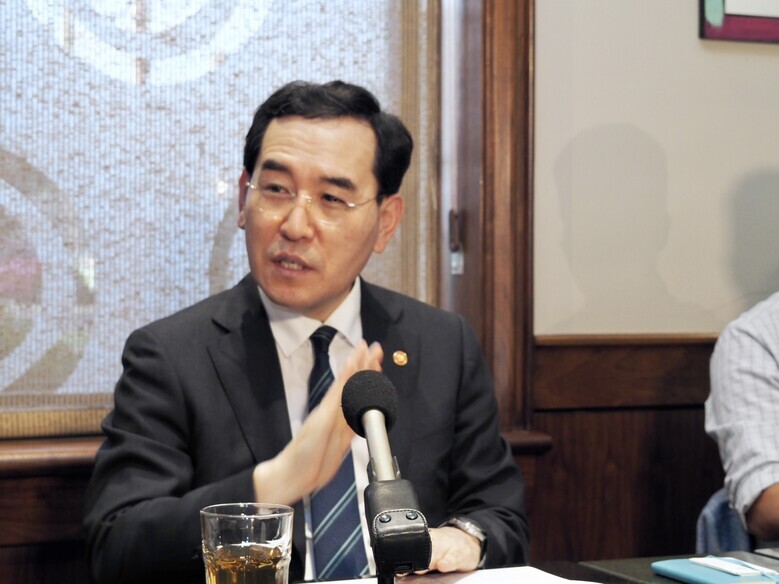hankyoreh
Links to other country sites 다른 나라 사이트 링크
S. Korean industry minister says Biden’s EV tax credit snub could leave US “losing out” down the road

While in Washington on Tuesday to discuss tax break discrimination against South Korean-made electric vehicles (EVs), South Korea’s minister of trade, industry and energy said he plans to express to the US that it stands to lose out on bigger gains if the situation causes a strain in relations with Seoul.
Speaking with foreign correspondents in Washington, Industry Minister Lee Chang-yang noted that there are “many areas where we and the US need to cooperate.”
“I intend to convey that the momentum for approaches in the larger framework could be sacrificed if our relationship becomes strained and [South Korean] opinion sours because of the Inflation Reduction Act, and that the US could end up losing out on bigger gains,” he explained.
The comment came ahead of his meeting with US Secretary of Commerce Gina Raimondo, scheduled for Wednesday.
Lee noted the various areas where the US and South Korea have engaged in cooperation since the Joe Biden administration came to office, including the Indo-Pacific Economic Framework (IPEF), Chip 4, and the Minerals Security Partnership.
“In this climate of positive cooperation, you could end up with a result where the Inflation Reduction Act sends the wrong signal about the US’ efforts to the South Korean press, government, general public and National Assembly,” he warned.
Explaining that the discriminatory treatment against South Korean EVs could have a negative impact on efforts by the US to reinforce their supply chains, Lee said he planned to tell the US that it was “not advisable to have this aspect of excessively prioritizing one’s own country.”
He also shared the same position in a meeting that day with Rep. Barry Moore, a Republican who represents a district in Alabama where Hyundai Motor has a factory.
Lee went on to say that planned to apply a “political approach” to resolving the issue of EV discrimination.
“The US government isn’t likely to be persuaded if we go about it simply by emphasizing how provisions in the Inflation Reduction Act violate World Trade Organization standards or contain discriminatory elements,” he explained.
Instead, he said his plan would involve a “political” approach of stressing the many areas where the US and South Korea have to cooperate.
This was an indirect suggestion that South Korea may not opt to pursue WTO dispute resolution procedures, as some South Korean news outlets have reported. At the same time, Lee also said Seoul would continue coordinating with the European Union and Tokyo on areas where the discriminatory EV subsidy terms are potentially in violation of trade standards.
He further announced plans to discuss the CHIPS and Science Act, which heavily restricts investment in China by companies that receive subsidies to establish semiconductor production facilities in the US.
Warning that faulty implementation of the “guardrails” provision restricting investment could have a “negative impact on global industry as a whole,” he stressed, “It is not desirable from the US standpoint for this to impact semiconductor supplies.”
Lee acknowledged that the problem would be difficult to resolve. Upon his arrival at an airport near Washington that day, he told reporters, “Fundamentally, the Inflation Reduction Act is a piece of legislation created by Congress, and it isn’t easy to directly influence Congress through negotiations between administrations.”
By Lee Bon-young, Washington correspondent
Please direct questions or comments to [english@hani.co.kr]

Editorial・opinion
![[Column] Life on our Trisolaris [Column] Life on our Trisolaris](https://flexible.img.hani.co.kr/flexible/normal/500/300/imgdb/original/2024/0505/4817148682278544.jpg) [Column] Life on our Trisolaris
[Column] Life on our Trisolaris![[Editorial] Penalties for airing allegations against Korea’s first lady endanger free press [Editorial] Penalties for airing allegations against Korea’s first lady endanger free press](https://flexible.img.hani.co.kr/flexible/normal/500/300/imgdb/original/2024/0502/1817146398095106.jpg) [Editorial] Penalties for airing allegations against Korea’s first lady endanger free press
[Editorial] Penalties for airing allegations against Korea’s first lady endanger free press- [Editorial] Yoon must halt procurement of SM-3 interceptor missiles
- [Guest essay] Maybe Korea’s rapid population decline is an opportunity, not a crisis
- [Column] Can Yoon steer diplomacy with Russia, China back on track?
- [Column] Season 2 of special prosecutor probe may be coming to Korea soon
- [Column] Park Geun-hye déjà vu in Yoon Suk-yeol
- [Editorial] New weight of N. Korea’s nuclear threats makes dialogue all the more urgent
- [Guest essay] The real reason Korea’s new right wants to dub Rhee a founding father
- [Column] ‘Choson’: Is it time we start referring to N. Korea in its own terms?
Most viewed articles
- 1New sex-ed guidelines forbid teaching about homosexuality
- 260% of young Koreans see no need to have kids after marriage
- 3[Column] Life on our Trisolaris
- 4OECD upgrades Korea’s growth forecast from 2.2% to 2.6%
- 5Presidential office warns of veto in response to opposition passing special counsel probe act
- 6Months and months of overdue wages are pushing migrant workers in Korea into debt
- 7[Guest essay] Maybe Korea’s rapid population decline is an opportunity, not a crisis
- 8[Editorial] Penalties for airing allegations against Korea’s first lady endanger free press
- 9[Reportage] On US campuses, student risk arrest as they call for divestment from Israel
- 10Korea sees more deaths than births for 52nd consecutive month in February